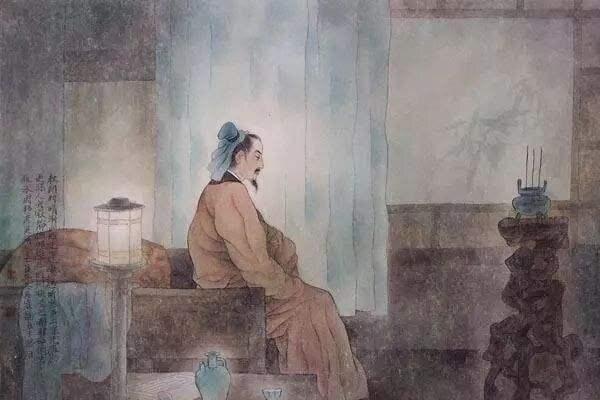After going to high school, I may not have read Zhou Bangyan's words, but reading "Three Hundred Songs of Song Ci" naturally can't get past Zhou Bangyan. Zhou Bangyan was a famous scholar in the middle and late Northern Song Dynasty, who excelled in his youth, and during the reign of Emperor Yuanfeng of the Song Dynasty, he wrote a poem describing the grand situation of The Capital city and praising the new law, which was favored by Emperor Shenzong and promoted to Taixuezheng (assisting Dr. Nine Pin Officials who practiced canons, study rules, and manage students). He was extremely good at poetry and song, and he liked to use the canon, the style of words was gentle, and he was called the founder of the Elegance School and the founder of the Gelug School, and in the various lexicographies of the Song, Yuan, Ming, and Qing dynasties, he was often called "the crown of the lyricists" or "lao Du (Du Fu) in the words".

Zhou Bangyan wrote a lot of words in his lifetime, and wrote the "Collection of Halal Residents", which could only not be passed on to modern times. Among Zhou Bangyan's many works, there is a song of ancient poetry that has been praised as a masterpiece in the mouths of successive generations of word critics, which perfectly integrates bai Juyi's two poems into it, "those who collect Tang poems melt like themselves, and their strengths are good (comments by Zhang Yan, a famous Gelug poet of the Southern Song Dynasty)." Today we will read Zhou Bangyan's famous "Xihe Jinling":
Jialidi, a southern dynasty event who remembers. The mountain encircles the homeland around the Qing River, and the beards are opposite. The angry waves hit the lonely city, and the wind swept the sky.
Cliff trees, leaning upside down, Mo worries about the boat was once tied. The empty remnants of the old are lush and the fog is half-solid. Late at night, the moon came over the female wall, sadly looking east at Huai Shui.
Where is the wine flag playing in the city? Want to faintly, Wang Xie neighborhood, swallows do not know what the world, into the ordinary, lane strangers' homes, relatively as if to rise and fall, slanting the sun.
Jinling, which is what we now call Nanjing, is a very famous city in ancient China, and there are many verses related to Jinling City in the Tang and Song poems, such as: Wang Zhenbai's "Shicheng several changes lords, the heavens are full of emptiness"; Li Bai's "Cangcang Jinling Moon, Empty Hanging Imperial State"; Xin Renjie's "Pay the benefits of Jiangshan to the public, Jinling Imperial Prefecture". Zhou Bangyan's poem is a clever integration of Liu Yuxi's "Stone City" and "Wuyi Lane", expressing his emotions through the untraceable use of the poems of his predecessors.
On the film, writing about the geographical situation of Jinling City, the opening chapter is extremely praised for Jinling City - "Jialidi". Jinling City was the capital of many regimes during the Southern and Northern Dynasties, however, the prosperity of the past has long been forgotten with the flow of water. However, what remains unchanged is still the mountains and rivers of Jinling City, "the mountain encircles the homeland around the Qingjiang River, and the hair is opposite", Jinling City is also known as the Stone City, when the beginning of the year was built in Jinling, with stone walls, surrounded by mountains, the terrain is steep, Jinling is surrounded by mountains and rivers, beautiful like a woman. In the past, the regime changed, wars were frequent, but now it has long been quiet, becoming an isolated city, making people feel lonely and lonely, Jinling City is snubbed, Zhou Bangyan was already in the late years of his life when he wrote this poem, and the Northern Song Dynasty was not stable at all, Fang La revolted, Zhou Bangyan moved to the south, seeing that Jinling is being forgotten, nostalgia for the past is born.
In the middle piece, writing about the ruins of Jinling City, the scene in front of you is still the same as hundreds of years ago, everything is still there: the cliff tree is still leaning backwards, it seems to be the tree that has been tied to the Mo Shuo boat. In the middle of the night, Zhou Bangyan was still standing on the pavilion to see the night view of the Qinhuai River.
In the next film, although there are some scenes depicted, the emphasis is on lyricism. Jinling has a scene more people, Zhou Bangyan in the pavilion can see the nearby restaurant theater is still prosperous, can't help but think of the Eastern Jin Dynasty Wang Xie family's home is in the place of this restaurant theater, it turns out that Wuyi Lane has changed the owner. Zhou Bangyan couldn't help but sigh - things are not human, "swallows do not know what the world is, into the ordinary, alley strangers's home", in Zhou Bangyan's eyes, the swallows must know that the house has changed owners, chatting about the rise and fall of the regime in the slanting sun. Where is the swallow talking about the rise and fall of the big thing, it is clear that Zhou Bangyan himself is sighing.
Some people say that Zhou Bangyan's poem is satirizing the irony of the old party faction being belittled at that time, they are like the former Jinling City, things are not people. Regardless of the meaning, Zhou Bangyan's poem combines a depressed mood with a depressed mood, and the realm is excellent.
Reference: "All Song Words"